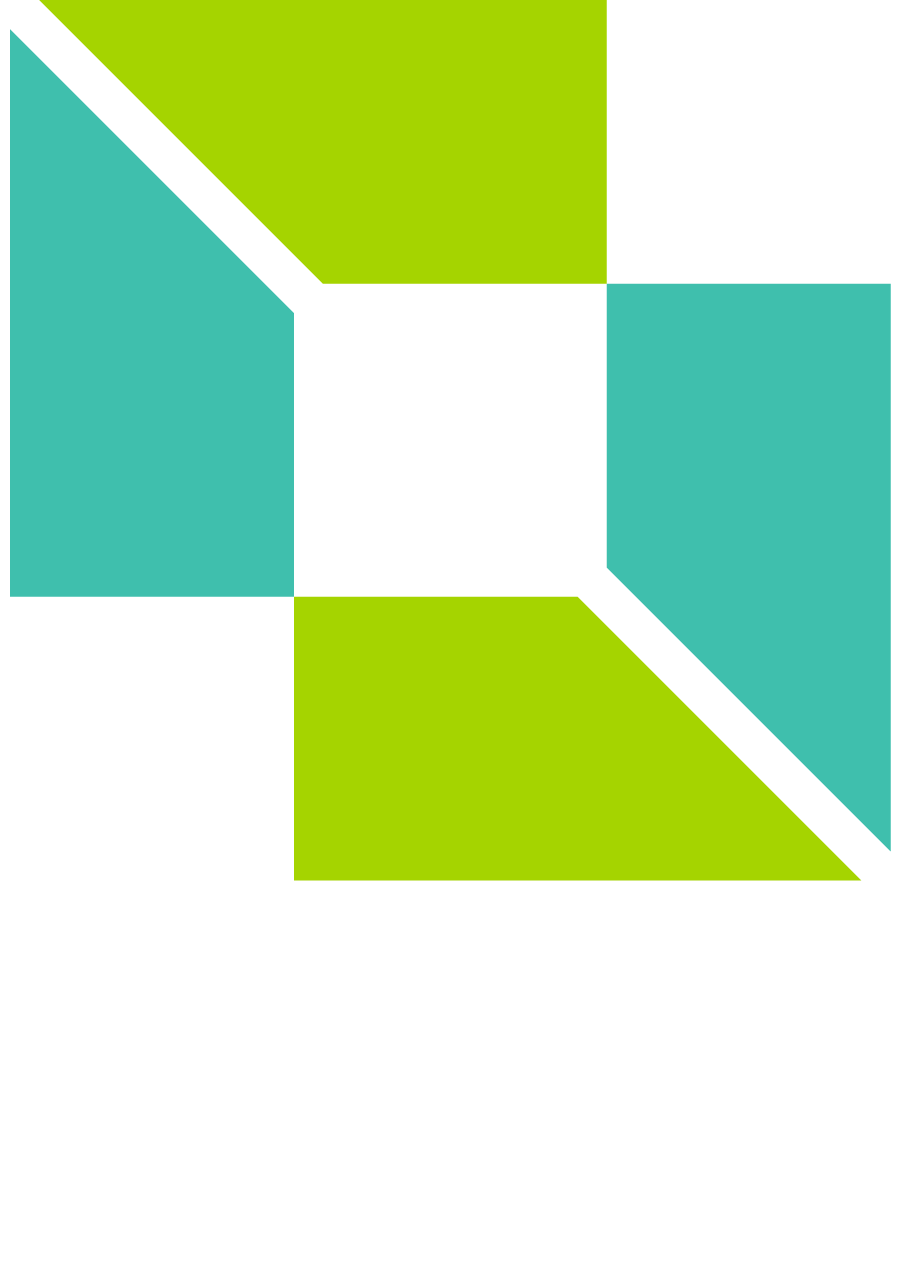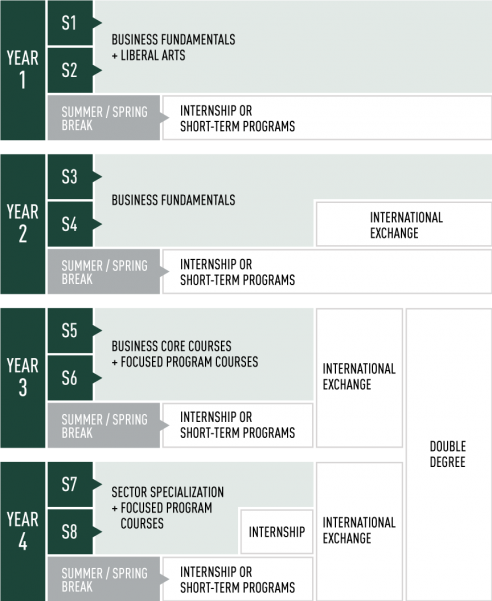Global BBA Curriculum
All the classes in our university are organized by the quarter system (the academic year is split into 2 semesters, equaling to 4 terms in total) and each class will be completed in a single term (lasting 7 weeks). Utilizing the case method, each class lasts 200 minutes long (100 minutes x 2). There will be a maximum of 5 classes per week, and in the majority of cases, students will have only one class per day. This allows ample time for the preparation of self-study of cases, extracurricular activities, and part-time work
Global BBA Program Map
The image is an example of the program map of how a student can plan their time from enrolment through to graduation. Whilst not mandatory, the items listed in white offer a fantastic chance to experience other languages, cultures, as well as working experience through internships.
Global BBA Curriculum
The first two years of the Global BBA program are pre-registered core courses, and Year 3 & 4 will offer elective opportunities for students. The curriculum contains several Liberal Arts and introductory courses built into Year 1, providing a holistic and fundamental foundation. As the program progresses, the content dives deeper into business fundamentals at the organizational level in Year 2, culminating with managerial and leadership perspectives in Years 3 and 4. Case Writing is the capstone project of the Global BBA program and courses are organized throughout Years 3 and 4 through 4 seminars. The submission of an Original Case (instead of a traditional thesis/dissertation that tends to be customary in an academic program) is a mandatory graduation requirement. There are also NUCB Summer and Winter Programs available each year.
Japanese language courses are split into 6 different levels. A placement test will be conducted to select the best class for your level. Intermediate and Advanced Japanese language courses are also available for students that wish to progress their language skills.
| Introductory Japanese (1 - 4) |
| Pre Intermediate Japanese (A / B) |
| Intermediate Japanese (A / B)* |
| Advanced Japanese (A / B)* |
| Advanced Japanese Communication in Multicultural Contexts (A / B)* |
| Intercultural Communication (異文化コミュニケーション)* |
| Expression and Context in Japanese Language (言語表現法)* |
Year 1
| Economics | Introduction to Economics |
| Accounting | Introduction to Accounting |
| Finance | Introduction to Finance |
| Marketing | Introduction to Marketing |
| Entrepreneurship | Introduction to Entrepreneurship |
| Sustainability | Global Environmental Management & Economics |
| Law | Introduction to Business Law |
| Law and the Environment | |
| Business / Corporate Management | Introduction to Management |
| Operations | Operations Management |
| Data Science | Introduction to Business Analysis |
| Quantitative Analysis for Decision Making | |
| Skills | Critical Thinking |
| Design Thinking | |
| Business Presentation |
Year 2
| Economics | Business Economics | |
| Accounting | Managerial Accounting | |
| Finance | Financial Management | |
| Marketing | Marketing Management | |
| Marketing Research | ||
| Entrepreneurship | Business Model Design | |
| Design Science | ||
| Management | Organizational Management | |
| Human Resources Management | ||
| Strategic Thinking | ||
| Organizational Behavior | ||
| Business Succession Planning | ||
| Supply Chain Management | ||
| International Management | ||
| Business Plan | ||
| Business Ethics | ||
| Service Management | ||
| Research Methods | ||
| Technology | Data Visualization | |
| Management Information Systems | ||
Year 3 & 4 (Electives)
| Economics | Economic Strategy |
| International Economics | |
| Financial Econometrics | |
| Accounting | Sustainability Accounting |
| Financial Accounting | |
| Finance | Corporate Finance |
| Investments in Japan | |
| Marketing | Brand Marketing |
| Digital Marketing | |
| Global Marketing | |
| Entrepreneurship | Digital Entrepreneurship |
| Platform Strategy | |
| Monetizing Emotions by Generative AI | |
| Sustainability | International CSR & Sustainable Business |
| Leading the SDGs | |
| ESG | |
| Leading Sustainable Businesses | |
| Business / Corporate Management | International Comparative Management |
| Doing Business in Japan | |
| Knowledge Management | |
| Managing Family Business | |
| Corporate Governance | |
| Leading Asian Businesses | |
| HR & Organization Behavior | Stakeholder Management |
| Understanding Japanese Organizations | |
| Organization & Leadership | |
| Organizational Psychology and Business | |
| Operations | Operational Excellence |
| Business Logistics Management | |
| Technology and AI | Digital Transformation |
| Technology Management | |
| Disruption by Big Data/AI | |
| Artificial Intelligence in Business Management | |
| Data Science | Big Data and Analytics |
| Data-Driven Decision Making | |
| Business Analytics | |
| Skills | Leadership in Cross-Cultural Digital World |
MBA Essentials
MBA Essential Courses are 1-credit courses at NUCB Business School, our Graduate School of Management, and they allow students to experience specific courses at the MBA level and to build their network.
Successful completion of a certain number of these courses can waive the written test requirement and offer eligibility for a scholarship to students who wish to pursue postgraduate studies at NUCB Business School (other requirements will be also applicable).
| High Reliability Organizations |
| Driving Digital Marketing |
| Developing Entrepreneurial Culture |
| Corporate Governance from Investors’ Perspective |
* Courses are subject to change.
Curriculum Policy
The curriculum policy is developed as follows in order to enable the fostering of all the abilities mentioned in the Diploma Policy, and the high standards will be ensured through continuous improvement (Assurance of Learning).
- Liberal Arts courses are implemented throughout the university for all the students to gain a broad range of knowledge and a deep understanding of ethics
- Specialized Subjects are implemented for deeper knowledge in the various specialized fields, and a learning path is designed for students to move from an introductory to an advanced level
- Foreign language courses and international programs are implemented to foster adaptability in the international community
- Domestic and international internships are implemented to develop practical abilities
- Participant Centered Learning is implemented by using the Case Method at the core of the teaching method
- Learning Goals (LGs), Learning Objectives (LOs) and grading criteria are detailed in each syllabus.
The Faculty of Management offers introductory courses in management and information technology areas as elementary Specialized Subjects in order to achieve the Diploma Policy, and lays the foundation for understanding corporate management and information technology management. The curriculum’s design enables a deeper academic understanding through Specialized Subjects covering various disciplines, such as business analysis, corporate management, business succession, and information technology management, and takes into account everyone’s future career paths.

 Download
Download
 Infosession
Infosession
 Application
Application
 Open Campus
Open Campus



